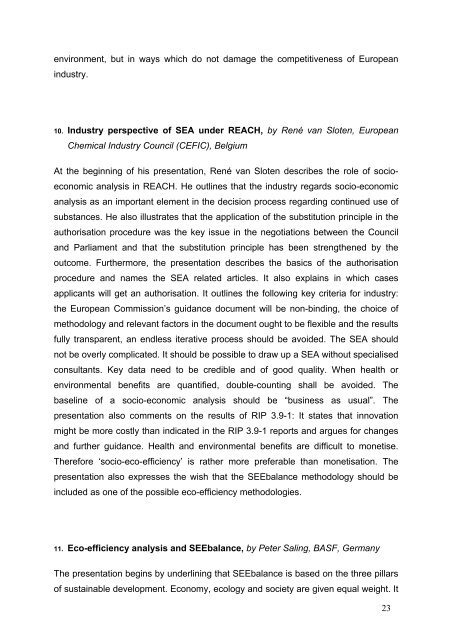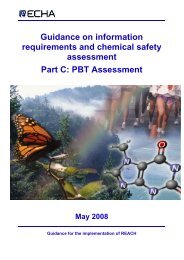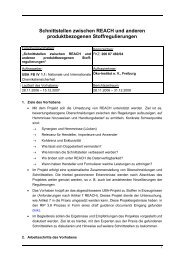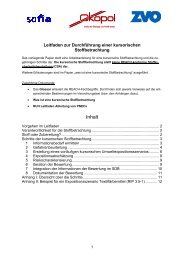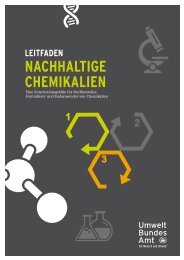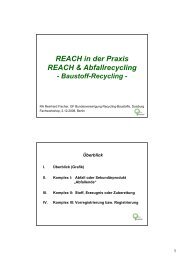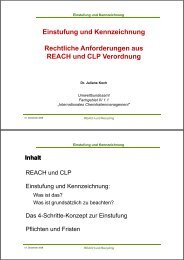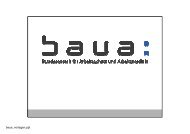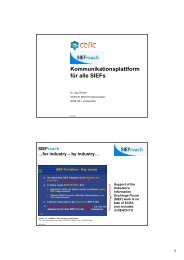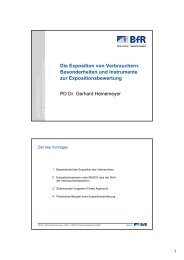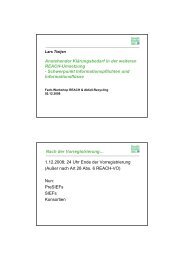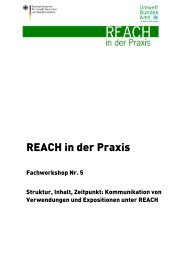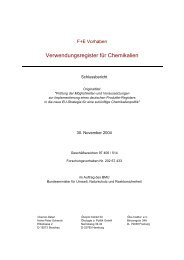“EU-Workshop on Socio-Economic Analysis under REACH ...
“EU-Workshop on Socio-Economic Analysis under REACH ...
“EU-Workshop on Socio-Economic Analysis under REACH ...
Create successful ePaper yourself
Turn your PDF publications into a flip-book with our unique Google optimized e-Paper software.
envir<strong>on</strong>ment, but in ways which do not damage the competitiveness of European<br />
industry.<br />
10. Industry perspective of SEA <strong>under</strong> <strong>REACH</strong>, by René van Sloten, European<br />
Chemical Industry Council (CEFIC), Belgium<br />
At the beginning of his presentati<strong>on</strong>, René van Sloten describes the role of socioec<strong>on</strong>omic<br />
analysis in <strong>REACH</strong>. He outlines that the industry regards socio-ec<strong>on</strong>omic<br />
analysis as an important element in the decisi<strong>on</strong> process regarding c<strong>on</strong>tinued use of<br />
substances. He also illustrates that the applicati<strong>on</strong> of the substituti<strong>on</strong> principle in the<br />
authorisati<strong>on</strong> procedure was the key issue in the negotiati<strong>on</strong>s between the Council<br />
and Parliament and that the substituti<strong>on</strong> principle has been strengthened by the<br />
outcome. Furthermore, the presentati<strong>on</strong> describes the basics of the authorisati<strong>on</strong><br />
procedure and names the SEA related articles. It also explains in which cases<br />
applicants will get an authorisati<strong>on</strong>. It outlines the following key criteria for industry:<br />
the European Commissi<strong>on</strong>’s guidance document will be n<strong>on</strong>-binding, the choice of<br />
methodology and relevant factors in the document ought to be flexible and the results<br />
fully transparent, an endless iterative process should be avoided. The SEA should<br />
not be overly complicated. It should be possible to draw up a SEA without specialised<br />
c<strong>on</strong>sultants. Key data need to be credible and of good quality. When health or<br />
envir<strong>on</strong>mental benefits are quantified, double-counting shall be avoided. The<br />
baseline of a socio-ec<strong>on</strong>omic analysis should be “business as usual”. The<br />
presentati<strong>on</strong> also comments <strong>on</strong> the results of RIP 3.9-1: It states that innovati<strong>on</strong><br />
might be more costly than indicated in the RIP 3.9-1 reports and argues for changes<br />
and further guidance. Health and envir<strong>on</strong>mental benefits are difficult to m<strong>on</strong>etise.<br />
Therefore ‘socio-eco-efficiency’ is rather more preferable than m<strong>on</strong>etisati<strong>on</strong>. The<br />
presentati<strong>on</strong> also expresses the wish that the SEEbalance methodology should be<br />
included as <strong>on</strong>e of the possible eco-efficiency methodologies.<br />
11. Eco-efficiency analysis and SEEbalance, by Peter Saling, BASF, Germany<br />
The presentati<strong>on</strong> begins by <strong>under</strong>lining that SEEbalance is based <strong>on</strong> the three pillars<br />
of sustainable development. Ec<strong>on</strong>omy, ecology and society are given equal weight. It<br />
23 23


